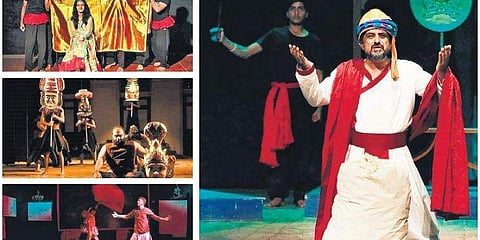
- LIFESTYLE
- FASHION
- FOOD
- ENTERTAINMENT
- EVENTS
- CULTURE
- VIDEOS
- WEB STORIES
- GALLERIES
- GADGETS
- CAR & BIKE
- SOCIETY
- TRAVEL
- NORTH EAST
- INDULGE CONNECT

What truly makes every award special to me is that, so far, they have been proposed by people who’ve seen my work. In a discipline like theatre, it makes me feel credible,” shares an elated Prasanna Ramaswamy. The Chennai-based theatre director recently received the Kalaignar MU Karunanidhi Porkizhi Award from Tamil Nadu chief minister MK Stalin on February 16 at the inauguration of the annual Chennai Book Fair.
A reward to remember
An admirer of the late former chief minister of Tamil Nadu M Karunanidhi and his welfare measures, Prasanna finds the recognition all the more fulfilling. “This being an endowment created out of his private fund for creative writing and theatre makes it even more special. I’ve also been fortunate to receive the Kalaimamani Award from him, for which I was selected after he witnessed my work Pirappokkum, based on Silappadikaram verses, enacted by 200 artistes. I created it for the Sangamam Festival, curated and directed by MP Kanimozhi.
The same was the case for the Sangeet Natak Akademi award as the name was proposed by Anita Ratnam, a long-term associate of my work, and Leela Samson who had supported the premiere of two of my productions at Kalakshetra during her tenure. It makes me feel validated,” notes Prasanna, who has directed theatre in Tamil, English, Urdu, Kannada languages, with the latest one being This is My Name, an adaptation of Paul Zacharia’s Malayalam novella Ithanente Peru that presents Nathuram Godse’s defence from the RSS idealogue position.
In a career spanning three decades, establishing her presence and carving a niche for her style of work among the audience has been no easy task. On gender discrimination, she says, “I’d like to imagine that every male director has the same set of problems and challenges that I undergo. As much as we say theatre is liberating and there’s no discrimination, there’s a general disquiet and a constant psychological pressure that goes around. Beyond the surface-level hitches, with every play, I emerge as a new person. The director goes to the edge of the cliff, dies, and is reborn with new wings. All this is completely facilitated by people with whom I go through the epic journey. I am forever grateful to all the actors, singers, and dancers who place their trust in me and my work, without whom none of my work would have been possible.”
Staging a success
Prasanna has directed productions for private companies in India like Koothu p Patrarai, Abiyenthararu, Mysore; Tehrik e Niswan of Pakistan and National School of Drama, Bengaluru as a guest director. Narrating how she’s differently placed from the rest of her contemporaries, she says, “I have never been supported by any foundation or University or a political party for my work. The support is not only about money. I’ve been invited to showcase my play outside Chennai many times. But I couldn’t accept the offers due to the lack of a support system. And two-thirds of my productions have been at my own cost.”
She admits that the reward for all the hard work and creative process that goes into every play comes through honest feedback from the actors, her collaborators like artist Guru, designer Adapa, and musicians who worked together. “Imayam Annamalai, a writer whose work I follow closely, would come from Virudhachalam to Chennai just to watch my play and return immediately. Pralayan, a theatre director, whose work I hold in high regard, wrote a detailed copy in a literary magazine about my work. Such gestures matter a lot,” she says.
While memorable incidents on the stage are aplenty for Prasanna, there’s one that’s close to her heart. “I’d invited playwright and poet HS Sivaprakash from Delhi for the premiere of Madaiah the Cobbler, written by him and directed directed by me. He congratulated the team after watching and said that through the play, I had evoked a whole cultural landscape. Those words were gratifying and echoed for a long time in my mind. I’m known for working with music, poetry, movement, and art in my plays. But after his comments, I realised that I am actually evoking a landscape in each of my productions,” she shares.
The pandemic brought her pursuit to a screeching halt, but she swung back in action once the restrictions were lifted. “The pandemic has been stressful and depressing. To me, the theatre is a live medium and I feared if the virtual route would be the way forward. When there was a six-month relaxation during the lockdown, I plunged into work with the play, This is My Name. People outside theatre do not know the amount of work that goes into producing every play. Currently, I may not be rehearsing a play on the floor; but three plays are happening inside my mind at the same time,” she shares.
Simply put, Prasanna lives her life through theatre. “Theatre work makes me feel alive and fearless, and art clarifies life, always, both as a practitioner and a partaker,” she signs off.